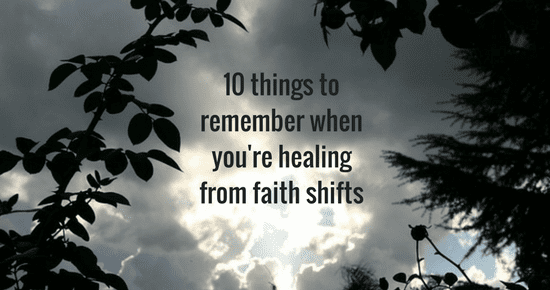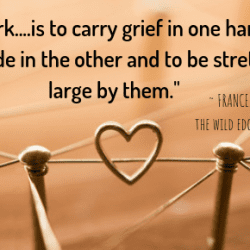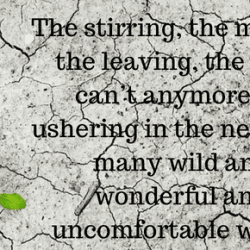
Healing from a radical shift in faith is a raw and weird process. Everyone navigates it differently, but one thing I’m clear on across our different paths is this: we have to take extra good care of ourselves in the process.
After sometimes learning the hard way what is and isn’t a good idea, here are a few suggestions to consider as we travel this path of losing so much of what we once held dear:
1. Be careful what we read. This fits into the same category as “don’t go online looking for medical advice” because it’s a sure way to multiply anxiety and make ourselves crazy. Choose wisely which blogs and books we read, which audio or videos to listen to. I do not allow myself to go on certain websites or click on certain links, period, because if I do, I can feel the spin.
2. Grief is weird. It comes in waves and can be extremely unpredictable. Allowing ourselves to roll with grief instead of resist feelings helps a lot. It’s important to respect that different interactions will trigger unexpected painful feelings. Still experiencing waves of grief after many months or years are not a sign we are stupid; I can sometimes do just fine and then hear a story about something at a church and grief sweeps in again. It’s a freaky feeling, but I’m learning to roll with it better.
3. It’s okay to “just say no” to certain events. In fact, it’s often a necessity! It’s hard when friends are still part of the systems we left, but that doesn’t mean we have to keep torturing ourselves. I have been invited to parties, weddings, and events where I knew I wouldn’t have enough solid ground underneath me so I didn’t go. It usually was a wise decision. Sure, I have had to push through my discomfort sometimes for really special gatherings; however, on the whole, I still evaluate whether or not it’s a good idea for my soul. Often but not always, it’s not.
4. We don’t have to justify our anger or sadness to anyone. Our feelings are ours, not anyone else’s. Everyone processes pain differently. Many people are afraid of emotions like anger and sadness and will do anything possible to shut them down in themselves and others, too. One of the things that gives us the most trouble in the healing process is feeling guilty about how we are feeling. Part of our survival is learning to let go of trying to explain or justify or defend our feelings. My experience has been the more I express my real feelings in a safe space, the more they heal. The more I try to stuff or manage or minimize them, the more they fester and cause more damage.
5. It’s a long road that can’t be rushed. Oh, how we want to get to a new place as fast as possible! But when we’re talking about the losses in Unraveling or years, decades, and lifetimes of faith-a-certain-way or recovering from Goddamage we have to embrace the longer story of healing. Finding our way forward doesn’t come in weeks or months but years and years.
6. Find ways to laugh, and laugh some more. It really is the best medicine. And often our only hope to keep healing.
7. Some relationships won’t make it through the transition. They just won’t. I was hoping to hold on to a few more of them, but what I realized over time is when we experience a fundamental shift in the lens we view God, church, and the world through, we lose a lot of what we had in common. It’s okay. I am sad about some of the losses but also trying to celebrate what was and accept that certain friendships had their season. I thank God I knew some of these people, but it’s sometimes awkward when we see each other. Accepting this new reality has helped me a lot (although I totally still hate those weird moments).
8. Make time for safe, life-giving relationships. Even if we don’t really have the time, find it. It’s crucial to create space to be with people who understand the same feelings and experiences, kindred spirits online or in real life, and safe spaces to freely share what’s really going on in our heads without having to worry about defending anything. I wouldn’t be here today without my people.
9. The serenity prayer. I am partial to it because of being in recovery and healing groups for a long time, but it is such a wise, simple, and sustaining prayer. To accept the things we can’t change, to gain courage to change the things we can, and honor hardship as a pathway to peace is good advice.
10. Swearing can help. Sometimes, they’re really the right words, specially if you have tried to be “good” for way too long!
There are many more, that’s for sure, but these are some off the top of my head. What else would you add?
Be good to yourself on this bumpy path. My heart is with you from Colorado.












